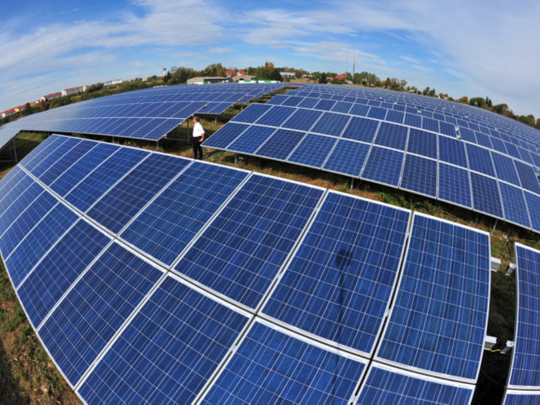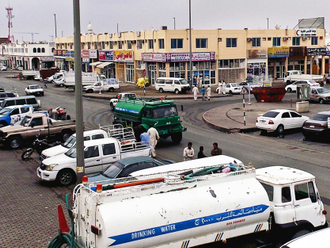
After relying on hydrocarbons for its energy needs for a long time, the UAE in recent years began to open up to the potential of alternative energy. One big step forward was taken in 2009 when the UAE was chosen to host the global headquarters of the International Renewable Energy Agency (Irena), which aims to promote widespread and increased adoption and sustainable use of all forms of renewable energy.
While in the beginning some foreign nations including the US weren’t so fond of the idea that one of the world’s largest oil-producing nations would host a multinational renewable energy agency, it was Germany, the founding nation of Irena, which supported the selection of the UAE to build the global headquarters here. Today, Irena is one of the key institutions for Germany for executing renewable projects in the UAE and the entire Middle East.
One of the core sectors where the UAE and Germany work together is solar energy, manifested in a Germany-based photovoltaic factory owned by Abu Dhabi’s renewable energy initiative Masdar. The $165-million (Dh606 million) plant near Erfurt in Germany describes itself as “a part of the large and international Masdar family”, says its spokesman Janis Fischer. Masdar PV produces innovative thin-film solar products and solutions as part of the Masdar Power business unit and is a 100 per cent subsidiary of Masdar, which, in turn, is owned by Mubadala Development Company. It currently sells its products at comparably competitive prices to customers in Europe, Canada and India.
The Germany-based factory has been recently complemented by another solar panel plant in the UAE, the 100-megawatt Shams 1 concentrated solar plant, one of the largest in the world, which was opened in this March.
German environmental research institutions are also connected to the Masdar Institute of Science and Technology, which saw the first scholars graduate after a two-year research programme that focused on advanced energy and sustainable technologies, in June this year.
“Graduates from Masdar will contribute to further developing renewable energy areas. With the support of the UAE leadership, we have created an infrastructure and a talent base that can develop, build and strengthen decision-makers in future energy,” says Fred Moavenzadeh, President of Masdar Institute of Science and Technology.
Another German involvement can be found within the Masdar Research Network, a worldwide network that links researchers in a wide range of disciplines and aims at pioneering the development in renewable energies. From Germany, RWTH Aachen University and the German Aerospace Centre have joined the network so far.
The cooperation between the two countries is most fruitful in solar power projects. The UAE, like other Gulf nations, has solar insolation levels that far exceed those found in European countries, including Germany, which, in turn, has already achieved substantial solar deployment. Thus, advanced German renewable energy companies venturing into the UAE is actually a no-brainer.
The UAE could economically deploy solar power generation capacity of more than 20 gigawatts by 2030, says to Steve Griffiths, Executive Director of the Masdar Institute of Science and Technology and board member of the Emirates Solar Industry Association.
“There is a strong need to translate technical potential to economic benefits to guide solar energy policy development that will stimulate solar energy technology deployment,” Griffiths says.
Another initiative that involves German backing is Dubai’s move to promote solar rooftop panels. Dubai is currently finalising legislation that will enable property owners to feed solar power into the grid, most likely on the basis of feed-in tariffs, says Ivano Iannelli, CEO of the Dubai Carbon Centre of Excellence.
Solar partners
In May this year, Germany’s largest photovoltaic producer SolarWorld partnered with Dubai-based distributor PTL Solar to sell its products in the UAE and the greater Gulf region, the Middle East and Africa.
“Our partnership with SolarWorld combines the ingenuity of a UAE-based company with the leading-edge technology of SolarWorld’s products,” says Prabissh Thomas, Founder and Group Managing Director of PTL Solar. “With an increased ability to service the market with durable and reliable solar modules, the partnership will additionally bring significant benefits to the community.”
A SolarWorld showroom has been launched in Dubai. SolarWorld plans “to provide progressive and effective energy solutions towards the market demand and needs and support the region,” says Carsten Pattberg, Head of Exports at SolarWorld.
This September, another German green energy company has entered the UAE. The juwi group, a project developer for renewable energy, has launched its new subsidiary, juwi Renewable Energies FZCO in Dubai, which aims to serve customers in North and East Africa and in the Arabian region. The company will act mainly as a consultant and engineering, procurement and construction partner specifically focusing on investors in solar projects. It is a joint venture between juwi group and the Dubai-based firm Z-One DMCC. The first projects will be realised in 2014.
“We are evaluating large solar parks in Africa, an area with an abundance of sun. Photovoltaic offers the region a great chance for sustainable economic development”, says Luca Sacchetto, Managing Director of juwi Renewable Energies FZCO.
Joint venture partner Yasser Gamil from Z-One DMCC says, “In the area of North and East Africa, the potential for the solar and wind energy sector is huge. So far, we were lacking the know-how to implement specific projects. Now, with juwi at our side as an important and experienced partner, we hope to change the market of renewable energies in the area.”
Ambitious projects
All in all, Abu Dhabi has the most ambitious renewable energy target in the UAE and wants to have 7 per cent of electricity from alternative sources by 2020. That goal was exceeded by 21 of the 27 European Union member states four years ago, including Germany. So advice from there is welcome as Masdar is also going ahead with projects other than solar, including the construction of a pilot project to test geothermal energy to convert warm ground water into chilled water that can be used for district cooling. There are also plans for a 30-megawatt wind farm on Yas Island.






